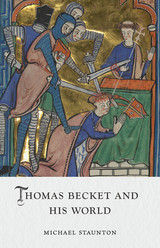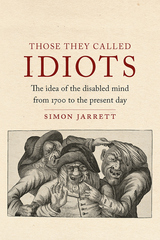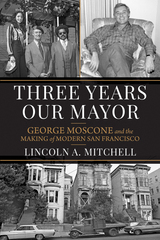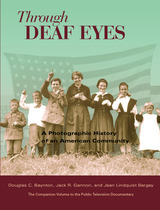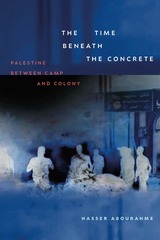8 books about Complete Writings
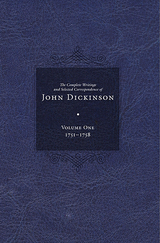
Complete Writings and Selected Correspondence of John Dickinson
Volume 1
Jane E. Calvert
University of Delaware Press, 2011
The Complete Writings and Selected Correspondence of John Dickinson, vol. 1 inaugurates a multivolume documentary edition that will, for the first time ever, provide the complete collection of everything Dickinson published on public affairs over the course of his life. The documents include essays, articles, broadsides, resolutions, petitions, declarations, constitutions, regulations, legislation, proclamations, songs and odes. Among them are many of the seminal state papers produced by the first national congresses and conventions. Also included are correspondences between Dickinson and some of the key figures of his era. This edition should raise Dickinson to his rightful place among America’s founding fathers, rivaled in reputation only by Benjamin Franklin before 1776. Dickinson was celebrated throughout the colonies, as well as in England and France, as the great American spokesman for liberty, and the documents in this edition evidence his tireless political work and unmatched corpus.
[more]
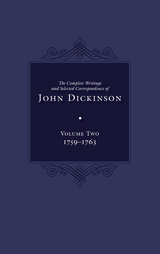
The Complete Writings and Selected Correspondence of John Dickinson
Volume 2
Jane E. Calvert
University of Delaware Press, 2021
John Dickinson’s entry into public life in Delaware and Pennsylvania is a highlight of the ninety-eight documents written over four years printed in Volume Two of The Complete Writings and Selected Correspondence of John Dickinson. The volume opens with Dickinson’s legal notes as he established himself as one of the most prominent and learned lawyers in colonial British North America. His cases dealt with, among other issues, interpretation of wills, disputes over land, sailors suing for wages, a fine on a Quaker who refused military service, and a notorious murder in a prominent Philadelphia family. It concludes with Dickinson offering thoughtful advice to a young man who was considering the arduous work in becoming a lawyer. “I think,” he wrote, “those must be infinitely the most happy, whose fatigues are softend by a conscious Benevolence of mind wishing & endeavouring to [pro]mote the Happiness of others as well as their own.”
Dickinson’s hard work on behalf of his clients brought him success in other areas of his public life. In October 1759, he was elected to his first public position as a representative for Kent County, Del., the following year he was elevated to the position of speaker, and in 1762, he became a representative for Philadelphia County, Pa. As a legislator in two colonies, learning his craft as a global war unfolded, he contributed to bills on military and defense, Indian relations, infrastructure improvements and city management, and served on various committees. The death of George II occasioned debates over laws and judges, in which Dickinson participated. This era concludes with Dickinson playing a central role in managing the unfolding Paxton Riots, in which frontiersmen massacred peaceful Indians and threatened the Quaker leadership of Pennsylvania.
In private, Dickinson lost the two most prominent male figures in his life in 1760, his father, Samuel, and soon thereafter, his mentor, colleague, and friend, John Moland. In honor of Moland, Dickinson published a poem and became a proxy head to Moland’s large family. Though his extant correspondence during this period is small, he exchanged letters with Mary Cadwalader Dickinson, Israel Pemberton, William Allason, George Read, Thomas McKean, and others. Perhaps most significant, he wrote a lengthy, unpublished essay on the flag-of-truce trade and also maintained commonplace books as he considered his place within the British Empire, opening up the next phase in Dickinson’s life as a leader of the resistance against Britain.
Published by the University of Delaware Press. Distributed worldwide by Rutgers University Press.
Dickinson’s hard work on behalf of his clients brought him success in other areas of his public life. In October 1759, he was elected to his first public position as a representative for Kent County, Del., the following year he was elevated to the position of speaker, and in 1762, he became a representative for Philadelphia County, Pa. As a legislator in two colonies, learning his craft as a global war unfolded, he contributed to bills on military and defense, Indian relations, infrastructure improvements and city management, and served on various committees. The death of George II occasioned debates over laws and judges, in which Dickinson participated. This era concludes with Dickinson playing a central role in managing the unfolding Paxton Riots, in which frontiersmen massacred peaceful Indians and threatened the Quaker leadership of Pennsylvania.
In private, Dickinson lost the two most prominent male figures in his life in 1760, his father, Samuel, and soon thereafter, his mentor, colleague, and friend, John Moland. In honor of Moland, Dickinson published a poem and became a proxy head to Moland’s large family. Though his extant correspondence during this period is small, he exchanged letters with Mary Cadwalader Dickinson, Israel Pemberton, William Allason, George Read, Thomas McKean, and others. Perhaps most significant, he wrote a lengthy, unpublished essay on the flag-of-truce trade and also maintained commonplace books as he considered his place within the British Empire, opening up the next phase in Dickinson’s life as a leader of the resistance against Britain.
Published by the University of Delaware Press. Distributed worldwide by Rutgers University Press.
[more]

Complete Writings and Selected Correspondence of John Dickinson
Volume 3
Jane E. Calvert
University of Delaware Press, 2024
During the years 1764 through 1766, John Dickinson became a leading figure in the Pennsylvania Assembly and in the growing American resistance to unjust British taxation. The documents in this volume show that, in both roles, he sought to protect the fundamental rights of ordinary Americans. In the 1764 Assembly, after working to punish those responsible for the slaughter of peaceful Indians, Dickinson challenged Benjamin Franklin and Joseph Galloway in their plan to abolish Pennsylvania’s unique Quaker constitution that secured liberty of conscience and place the colony under the control of the Crown. Then, in 1765, he served as primary draftsman at the Stamp Act Congress in New York, producing the first official American documents of the Revolutionary Era. In his private capacity, Dickinson continued to write through 1765 and 1766, publishing, among other documents, the first practical advice to Americans on how to resist Great Britain. The present volume also contains draft legislation, fascinating case notes from his legal practice, and personal correspondence.
[more]

Complete Writings and Selected Correspondence of John Dickinson
Volume 4, 1767-1769
John Dickinson
University of Delaware Press
In 1767, John Dickinson began publishing his twelve Letters from a Farmer in Pennsylvania, which earned him international celebrity as the leader of the American resistance to Britain. They educated Americans about their rights and how to defend them without violence. Importantly, they also taught the colonists to unite and understand themselves first and foremost as Americans rather than as Britons. He followed with letters on religious liberty in the Episcopal controversy and America’s first patriotic song, the “Liberty Song.” This volume documents the overwhelming public response around the Atlantic World to his writings. It was largely positive, with readers paying tribute to him in numerous ways, beginning with the Massachusetts circular letter to the other colonies advocating a nonimportation agreement. Most of the negative responses came from Dickinson’s enemy from the 1764 royal government controversy in Pennsylvania, Joseph Galloway, who orchestrated a smear campaign against “the Farmer.” Dickinson’s legal notes from this period include several interesting cases, such as his defense of a mixed-race servant woman charged with infanticide. Although there is limited extant correspondence, it includes letters concerning his courtship of his future wife, Mary Norris.
[more]
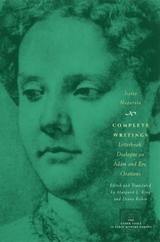
Complete Writings
Letterbook, Dialogue on Adam and Eve, Orations
Isotta Nogarola
University of Chicago Press, 2004
Renowned in her day for her scholarship and eloquence, Isotta Nogarola (1418-66) remained one of the most famous women of the Italian Renaissance for centuries after her death. And because she was one of the first women to carve out a place for herself in the male-dominated republic of letters, Nogarola served as a crucial role model for generations of aspiring female artists and writers.
This volume presents English translations of all of Nogarola's extant works and highlights just how daring and original her convictions were. In her letters and orations, Nogarola elegantly synthesized Greco-Roman thought with biblical teachings. And striding across the stage in public, she lectured the Veronese citizenry on everything from history and religion to politics and morality. But the most influential of Nogarola's works was a performance piece, Dialogue on Adam and Eve, in which she discussed the relative sinfulness of Adam and Eve—thereby opening up a centuries-long debate in Europe on gender and the nature of woman and establishing herself as an important figure in Western intellectual history. This book will be a must read for teachers and students of Women's Studies as well as of Renaissance literature and history.
This volume presents English translations of all of Nogarola's extant works and highlights just how daring and original her convictions were. In her letters and orations, Nogarola elegantly synthesized Greco-Roman thought with biblical teachings. And striding across the stage in public, she lectured the Veronese citizenry on everything from history and religion to politics and morality. But the most influential of Nogarola's works was a performance piece, Dialogue on Adam and Eve, in which she discussed the relative sinfulness of Adam and Eve—thereby opening up a centuries-long debate in Europe on gender and the nature of woman and establishing herself as an important figure in Western intellectual history. This book will be a must read for teachers and students of Women's Studies as well as of Renaissance literature and history.
[more]
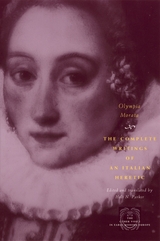
The Complete Writings of an Italian Heretic
Olympia Morata
University of Chicago Press, 2003
Winner of the 2004 Josephine Roberts Edition Prize from the Society for the Study of Early Modern Women.
A brilliant scholar and one of the finest writers of her day, Olympia Morata (1526-1555) was attacked by some as a "Calvinist Amazon" but praised by others as an inspiration to all learned women. This book publishes, for the first time, all her known writings—orations, dialogues, letters, and poems—in an accessible English translation.
Raised in the court of Ferrara in Italy, Morata was educated alongside the daughters of the nobility. As a youth she gave public lectures on Cicero, wrote commentaries on Homer, and composed poems, dialogues, and orations in both Latin and Greek. She also became a prominent Protestant evangelical, studying the Bible extensively and corresponding with many of the leading theologians of the Reformation. After fleeing to Germany in search of religious freedom, Morata tutored students in Greek and composed what many at the time felt were her finest works—a series of translations of the Psalms into Greek hexameters and sapphics.
Feminists and historians will welcome these collected writings from one of the most important female humanists of the sixteenth century.
A brilliant scholar and one of the finest writers of her day, Olympia Morata (1526-1555) was attacked by some as a "Calvinist Amazon" but praised by others as an inspiration to all learned women. This book publishes, for the first time, all her known writings—orations, dialogues, letters, and poems—in an accessible English translation.
Raised in the court of Ferrara in Italy, Morata was educated alongside the daughters of the nobility. As a youth she gave public lectures on Cicero, wrote commentaries on Homer, and composed poems, dialogues, and orations in both Latin and Greek. She also became a prominent Protestant evangelical, studying the Bible extensively and corresponding with many of the leading theologians of the Reformation. After fleeing to Germany in search of religious freedom, Morata tutored students in Greek and composed what many at the time felt were her finest works—a series of translations of the Psalms into Greek hexameters and sapphics.
Feminists and historians will welcome these collected writings from one of the most important female humanists of the sixteenth century.
[more]
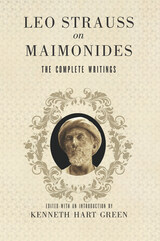
Leo Strauss on Maimonides
The Complete Writings
Leo Strauss
University of Chicago Press, 2013
Leo Strauss is widely recognized as one of the foremost interpreters of Maimonides. His studies of the medieval Jewish philosopher led to his rediscovery of esotericism and deepened his sense that the tension between reason and revelation was central to modern political thought. His writings throughout the twentieth century were chiefly responsible for restoring Maimonides as a philosophical thinker of the first rank. Yet, to appreciate the extent of Strauss’s contribution to the scholarship on Maimonides, one has traditionally had to seek out essays he published separately spanning almost fifty years.
With Leo Strauss on Maimonides, Kenneth Hart Green presents for the first time a comprehensive, annotated collection of Strauss’s writings on Maimonides, comprising sixteen essays, three of which appear in English for the first time. Green has also provided careful translations of materials that had originally been quoted in Hebrew, Arabic, Latin, German, and French; written an informative introduction highlighting the original contributions found in each essay; and brought references to out-of-print editions fully up to date. The result will become the standard edition of Strauss’s writings on Maimonides.
[more]
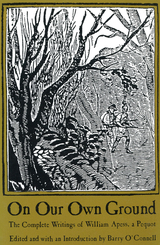
On Our Own Ground
The Complete Writings of William Apess, a Pequot
William Apess
University of Massachusetts Press, 1992
William Apess was the first Native American’s to fully, and publicly, speak out regarding the racism and unfair treatment that he and others endured. The author’s writing is eloquently delivered, instilling the reader with a realistic framework of a polit
[more]
READERS
Browse our collection.
PUBLISHERS
See BiblioVault's publisher services.
STUDENT SERVICES
Files for college accessibility offices.
UChicago Accessibility Resources
home | accessibility | search | about | contact us
BiblioVault ® 2001 - 2025
The University of Chicago Press


